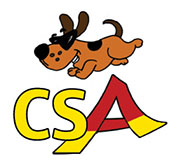Diane Sanders and Beth Diehl has been competing in agility since 1997. They have both competed with various small dogs (12" and 16") and large dogs (20", 24" and 26") and compete very regularly... over 40 shows a year in both USDAA and AKC venues.
Our classes are geared towards people currently competing in dog agility. 90% of our classes are Open and Excellent level dogs but we occasionally teach a class of novice dogs with experienced handlers. We do not teach novice dog/novice handler or pet agility classes.
Diane and Beth met at an agility training class and both were frustrated at the amount of "floor time" they got with their dogs on the equipment and the amount of time their instructors would watch their runs. Our class format and teaching style has developed out of what we wanted for our dogs when we did not have our own equipment and were only able to train our dogs at classes.
CSA Classes offer:
• Limited class sizes - 8 dogs per class
• We watch our students run!!!
• You will not find us sitting in a chair talking to someone during a students run. We talk our students through each run, coaching them from start to finish, usually standing up on the course the whole time. If there is a blip, we have them fix it right then while it is fresh and they can work it out. The first run is identify and resolve trouble spots and the 2nd time through the same course is putting it all together and running with speed.
• Practice walking 2 courses and then running each. We make students walk both courses at the beginning of class and then they run one side 2 times and switch instructors and run the other side 2 times. This way they learn to remember a course they walked earlier even after running something else in between. We find this helps at trials when 2 courses are walked at the same time.
• We do not set an egg timer :) Our classes end when everyone has run both sides 2 times. If there are errors or improvements to be made, they are made, it is a class not a run through. If we run over.. when we run over!! This happens more often than not so students in later classes learn to be patient and wait for their class start time!
• No social hour - we do not encourage social hour during classes. Our students are there to learn and run their dogs so we do not take up their class time talking about the weekend trial or new titles. If they want to discuss them on the CSA Yahoo groups , that is great! During classes, we run dogs and learn to handle. We encourage students to watch each other's runs instead of talk so they can learn from others mistakes but also to cheer for their success'.
• Flexibility - we do not require dogs to have a certain title before entering an excellent class. If there is an experienced handler with a younger dog that wants to be challenged, we are all for them coming to a more advanced class than they are competing at provided they are willing to shorten the sequence if it is too far over their dogs head and they know when to break it down into smaller pieces. Just because one dog has a leg in Excellent does not mean it cannot be in a class with a younger dog in open with a handler that has 10 years experience and is training on lots of equipment at home.
• Missed class policy - we do not have make up classes. Instead we allow our students to advertise they will be missing a class on the CSA Yahoo Group and if another CSA Student wants the spot they will take it and reimburse the student who missed the class. We also have an alternate list of people who are not in a class but want to be able to jump in occasionally and take a spot or they are waiting for a permanent spot.
• Students - Our students have earned MACH's, ADCH's, CATCH's and NATCH's and other championship titles in all major agility venues. Our students have competed in foreign countries representing the US and have stood on the podium at national championships! Many of them compete with us at regional and national events. Our students are supportive of each other and many break into small groups to train during the week at other locations.
• Other classes and seminars - we encourage our students to attend seminars and camps to learn new techniques and get a fresh prospective. We also attend many seminars and camps throughout the year from various instructors as well in order to stay current on training techniques. We do not mind our students taking classes at other locations or from other instructors provided they understand they will get our opinion on something from us which may differ from someone else's opinion. Whatever approach they decide to go with, we will help them maintain the criteria they have defined for that performance. I'm not a blender, stick to one method and be consistent and stay with it. Whatever it is.
• Contact Sports Agility trials - we do not require students to work but appreciate help with the shows, especially loading and unloading of the equipment. We host 5 to 6 USDAA trials a year. Our students get first priority on the CSA summer camp and when signing up for new classes.

